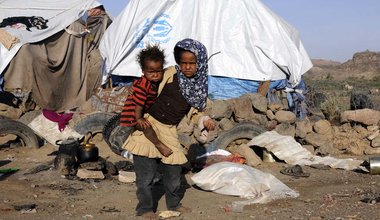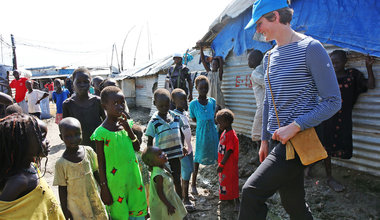At UN, Honduran President reports on country’s efforts to recover from myriad impacts of financial crisis
 Spotlighting the fallout of global financial crisis, which had a profound impact on his country, especially for the most vulnerable, Juan Orlando Hernández Alvarado, the President of Honduras, told the United Nations General Assembly today that with a great deal of effort, democracy has been restored, and less than three years ago, the country embarked "on the right path."
Spotlighting the fallout of global financial crisis, which had a profound impact on his country, especially for the most vulnerable, Juan Orlando Hernández Alvarado, the President of Honduras, told the United Nations General Assembly today that with a great deal of effort, democracy has been restored, and less than three years ago, the country embarked "on the right path."
He said the country suffered in many ways, including a crisis of confidence in institutions and the rise of criminal activity, which “blossomed out of control” because the Honduras could not pay services, leading to it being seen as unsafe by the rest of the world.
But today, after 32 months of hard work, economically, Honduras has seen an almost five per cent reduction in its fiscal deficit with sustained economic growth, even as larger Latin American economies were stagnating. Tax collection increased and its credit and risk rating improved. “We launched a national development programme – ‘Honduras 2020’ – to double private investment and the number of jobs created in strategic sectors over the next five years,” the President explained.
As regards citizen safety, he said Honduras “has dismantled the main drug cartels that were responsible for the most tragic violence in the history of our country,” and has broken up criminal gangs. It also made its intelligence capacity more robust, fighting impunity and corruption. “We have been quite successful in these endeavours,” the President continued, stressing that the “full frontal assault” on criminal activity had resulted in a notable decrease in violence, with a 26 per cent decrease in homicides.
Close international cooperation had assisted Honduras in combating organized crime, bringing corrupt public servants and others to justice and extraditing people accused of drug trafficking or organized crime. According to the Global Peace Index, Honduras no longer ranked in the top five most dangerous countries.
Turning to climate change, he said that Honduras has suffered a drought that has endangered food safety for almost 200,000 families, as well as the proliferation of a destructive insect which was destroying a sixth of its forests. His country received support from the UN and allies, including relevant technical assistance. It was developing an integrated policy to pay special attention to land, forest and waters and meet the enormous challenge that climate change represented for small countries.
Honduras is also tackling the root causes of migration abroad, he said. Those problems were transnational in nature and needed to be solved in a transnational manner. Due to its geographic position, Honduras has seen a flow of migrants, with the number increasing some 300 per cent in one year, demonstrating that migration is a global issue with global interests requiring a global solution.
Finally, he spoke about the rights of victims of violence, saying that the use of force and terror had become exalted, with criminals using victims’ images to highlight violent events. Countries which had experienced such violence, including Honduras, had a feeling of injustice when victim rights were not respected.
 UN
UN







